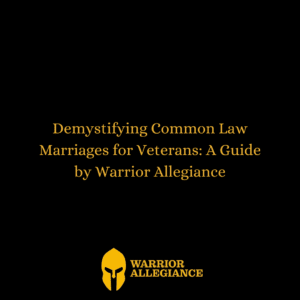
Hey there, Veterans! Today, Warrior Allegiance is diving into the intricate world of common law marriages and how they impact your claims for disability compensation. Strap in because we’re about to embark on a journey through the ins and outs of this often-misunderstood aspect of marital status.
Understanding Common Law Marriage Basics
First things first, let’s clear up what exactly a common law marriage entail. Common law marriages are unique in that they can be entered into without a formal ceremony or registration. It’s all about the agreement between the parties involved, without the need for a fancy wedding. Here at Warrior Allegiance, we want you to know that the VA recognizes common law marriages between individuals, including those of the same sex, if the marriage was established in a jurisdiction that recognizes such unions.
Navigating the Requirements
Establishing a common law marriage involves meeting certain requirements, and these can vary depending on where you live. Here’s where Warrior Allegiance comes in handy. We’ll help you understand the essential elements required when establishing a common law marriage, from the initial agreement between the parties to cohabitation and holding yourselves out as married. These elements are crucial, and Warrior Allegiance will ensure you have all the information you need to meet them.
Gathering Evidence
Now comes the fun part—gathering evidence to prove that you and your partner are indeed in a common law marriage. From lease agreements to joint bank statements, utility bills, and more, there’s a range of documents that can help support your claim. Warrior Allegiance knows just what evidence the VA is looking for, and we’ll assist you every step of the way in gathering and presenting it effectively.
State Recognition
It’s important to note that not all states recognize common law marriages, so where you live matters. Warrior Allegiance provides a handy reference guide to help you determine whether your state recognizes common law unions. We’ll ensure you’re armed with the knowledge you need to navigate this aspect of your claim with confidence.
Here’s a breakdown of how common law marriages are recognized across various states:
In terms of common law marriage recognition, Alabama, Montana, Alaska, Nebraska, Arizona, Nevada, New Jersey, Colorado, New York, District of Columbia, Florida, Ohio, Georgia, Oklahoma, Idaho, Pennsylvania, Illinois, Indiana, Rhode Island, Iowa, South Carolina, Kansas, South Dakota, Texas, Michigan, Minnesota, Mississippi, Wisconsin, and Missouri are recognized. New Hampshire only recognizes common law marriage upon the death of one partner, while South Carolina began recognizing it on July 24, 2019. States such as Arkansas, California, New Mexico, Connecticut, Delaware, North Carolina, North Dakota, Hawaii, Oregon, Puerto Rico, Kentucky, Tennessee, Louisiana, Maine, Maryland, Vermont, Massachusetts, Virginia, Washington, West Virginia, and Wyoming do not recognize common law marriages. Utah acknowledges them under limited circumstances specified by the Utah Code Section 30-1-4.5.
Challenges and Solutions
Establishing a common law marriage can sometimes be challenging, especially if there’s conflicting evidence or if one party disputes the union. But fear not! Warrior Allegiance is here to help you navigate these challenges. We’ll guide you through the development process, providing support and assistance every step of the way.
Conclusion
Common law marriages can be complex, but with Warrior Allegiance by your side, you can tackle any challenge that comes your way. We’re here to provide the support and assistance you need to navigate the VA claims process successfully. If you’re a veteran seeking disability compensation and have questions about common law marriages, don’t hesitate to reach out to Warrior Allegiance. We’re here to help you every step of the way.
FB Get Started – Warrior Allegiance : Are you VA Rated 90% or less? Let’s talk.

